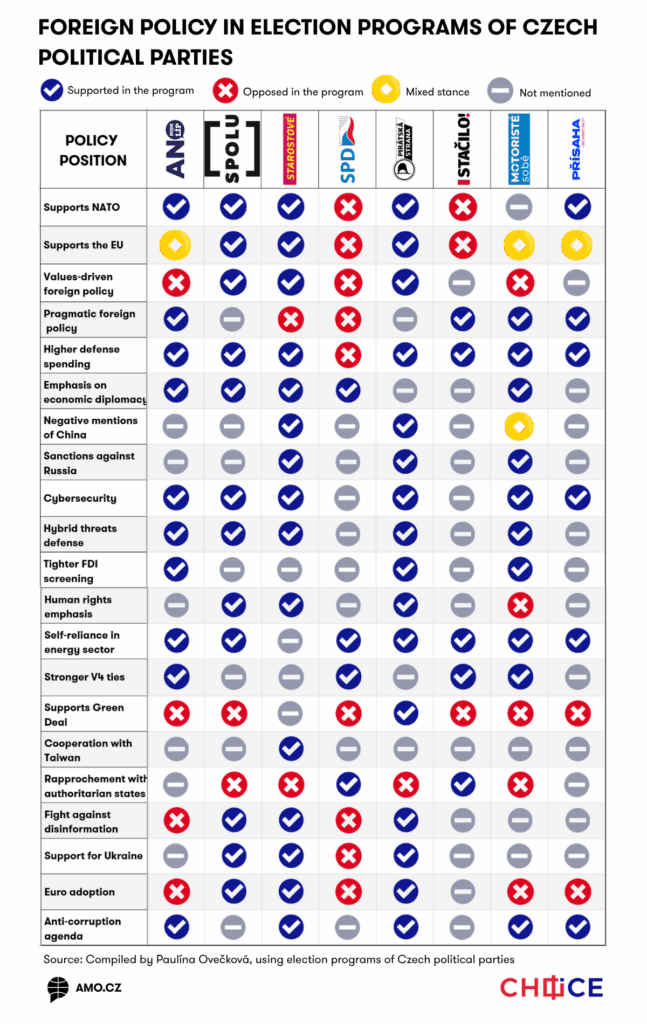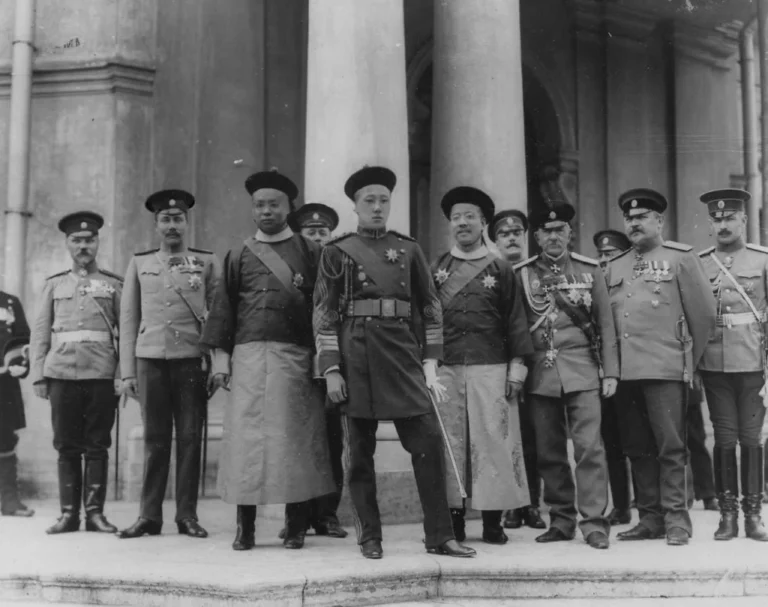Czech Elections: What’s Next for China Policy?

On October 3 and 4, Czechs cast their votes to elect a new government for the next four years. Polls suggest a stable victory for the opposition ANO party, led by the former prime minister and savvy businessman Andrej Babiš. Even though the populist ANO aims for a single-party cabinet, in practice it will probably need a coalition partner – or else try a minority government. Which party provides that support will be decisive in shaping one area where ANO lacks a clearly defined position – China policy.
The new government will likely present a major shift from the current values-based foreign policy championed by the present administration toward a more pragmatic, “Czech interests first” approach, with greater emphasis on economic diplomacy. In the election campaign, foreign policy is debated mainly in terms of the war in Ukraine, defense spending, and commitments to key alliances. China once again remains a peripheral issue, as was the case during the last parliamentary election. Only three out of eight likely-to-be-elected parties mention Beijing in their programs.
Current Administration: SPOLU (Together) but not with China
The past four years were marked by a clear turn away from China – especially after Miloš Zeman, whose presidency brought a decade-long affinity for Beijing, left office in 2023. His successor, Petr Pavel, aligned more closely with the foreign policy of the current government (comprising representatives from the Civic Democratic Party (ODS), Christian and Democratic Union – Czechoslovak People’s Party (KDU-ČSL), TOP 09 – the three parties forming a SPOLU coalition – plus Mayors and Independent (STAN), and Pirates, a party in opposition since 2024), enabling a more coherent effort to distance Czechia from China.
The current administration was also expected to release a revised China strategy, but no such document has been published. Foreign minister Jan Lipavský recently stated the ministry had in fact revised its China policy, which resulted in practical steps such as intensified cooperation with Taiwan, but the steps did not call for the document to be released publicly. The goal was to develop economic and scientific relations with Taipei, while “not crossing any lines with Beijing.”
Lipavský’s somewhat surprising meeting with his Chinese counterpart, Wang Yi, in February at the Munich Security Conference – the first high-level engagement since 2018 – went along the same lines. Both sides acknowledged the importance of continued dialogue. While Wang pressed for respect for China’s “core interests”, Lipavský balanced commitment to the “One-China” Policy with Czech-Taiwan cooperation, reflecting a cautious approach to Beijing amid global security and economic uncertainties.
Taiwan: Where Values Meet Pragmatism
Multiple Czech delegations to Taiwan and reciprocal visits from Taiwanese representatives have marked the deepened bilateral relations with the democratic nation. In September this year, the engagement culminated in the first Czech ministerial delegation to the island since the 1990s. Marek Ženíšek, the Minister for Science and Research, inaugurated the Czech Pavilion at SEMICON Taiwan, the most prestigious local semiconductor event, and met Taiwan’s President Lai Ching-te.
The results of this partnership can now be seen in the Czech National Museum in Prague – invaluable historical artifacts travelled from Taiwan to meet the eyes of Czech admirers – a loan agreement rarely extended except to the closest partners. On top of that, economic benefits are also beginning to take shape. In 2024, CzechInvest opened an office in Taiwan, facilitating Taiwanese investments in the Czech Republic, such as CTi Cable and C-Tech opening their European headquarters in the country. Equally notable is the growing research collaboration in semiconductors, centered on partnerships between Taiwanese companies and three Czech universities. These developments show that Czech-Taiwanese cooperation is not only based on shared democratic values, but also on pragmatic and mutually beneficial interests.
Election Programs and Plausible Scenarios
Economic pragmatism is a recurring theme across many of the parties’ campaign programs, and this could extend to their approach toward China. Other policy areas are also likely to shape future China strategy – most notably the almost ubiquitous emphasis on cybersecurity. Rising public concern, repeated intelligence warnings, and a recent attribution of the Chinese cyberattack on the Czech foreign ministry have made cybersecurity a central issue, and in this sense it can be viewed as a reflection of China policy. Besides that, several parties call for increased screening of foreign direct investment in strategic sectors. Earlier this year, the Czech government blocked the very first foreign investment ever: the Chinese company Emposat was prohibited from operating a ground satellite station in the Czech Republic due to espionage risks.

ANO’s program does not touch upon China, but its 2024 program for European Parliament’s (EP) elections described Beijing as an economic and technological rival for the EU. The document also stressed the need for lowering dependence on China, mostly in terms of strategic raw materials and EVs. Nevertheless, if ANO is unable to govern alone, it is likely to delegate foreign policy to a coalition partner, as it did during its 2018–2021 government, when the center-left Social Democrats (ČSSD) together with the then-President Miloš Zeman (2013–2023) largely shaped foreign affairs.
One possible coalition partner is the far-right Freedom and Direct Democracy (SPD), whose program emphasizes an “all-azimut” approach, implicitly suggesting improving relations with Beijing. In a recent debate, an SPD representative argued that Czechia should show greater respect for the “One-China policy”. In an earlier document on foreign policy, SPD condemned the “naivety” of pointing out China’s human rights violations and praised the economically-pragmatic stance of President Zeman.
The far-left grouping of Communist Party of Bohemia and Moravia (KSČM) and Social Democrats (ČSSD), Stačilo!, has been notably congenial about China. Its leader, Kateřina Konečná, expressed support for China’s solution to the war in Ukraine, and voiced hope of “finding common ground with the economic tiger again” during her China visit earlier this year. Another member of the party, Ondřej Dostál, attended an event organized by CCP’s propaganda department – which was flagged as dangerous by Czech and German intelligence services – just a few months after being elected to the EP.
If one of these parties were to control the foreign ministry, Czechia could see a return of Zeman-style gestures towards Beijing. However, both SPD and Stačilo! call for a referendum on exiting the EU and NATO, which ANO refuses. This creates an opening for a third fringe party, Motorists for Themselves, whose program is the most detailed when it comes to China policy. They call for normalizing bilateral relations “in line with other major European countries”, while keeping a sound approach on security issues, particularly the participation of Chinese tech companies in Czech tenders. In a TV debate, its representative voiced his concern for Europe’s dependency on China in green technologies such as solar and wind energy.
The final far-right, fringe party, Přísaha, is less likely to pass the five-percent threshold to enter the parliament but has also signaled pro-China leanings. In a pre-election debate on foreign policy, Jan Janků stressed the need for dialogue with China in the form of “harmony in diversity,” a phrase closely associated with the ideological discourse of the Chinese Communist Party.
Although ANO has dismissed the possibility of cooperating with SPOLU, STAN, or the Pirates such an outcome cannot be entirely ruled out. Though its current program makes no reference to China or Taiwan, this scenario would likely ensure continuity in China policy (provided the SPOLU coalition survives a potential debacle at the parliamentary election and the parties would jointly head to the opposition bench). STAN stands out as the only party explicitly endorsing cooperation with Taiwan, while warning about China turning into a competitor for Europe. Pirates’ program criticizes China for human rights abuses and in a recent debate they called for tangible steps toward ‘decoupling’ from China.
Another possible outcome – rumored in political corridors – is that, regardless of the coalition partner, the foreign ministry could be led by a professional diplomat rather than a political figure. While the execution would depend on the individual, such an appointment could help balance out symbolic pro-China gestures from fringe parties in government and keep Czechia aligned with the European mainstream, preventing alienation from allies. The role of the president should not be underestimated either, as the head of state can both set boundaries for the government and check excesses by steering foreign policy onto a more even keel.
Toward a More Pragmatic China Strategy?
The stances toward China are far from unified, which has been a mainstay in Czech China policy since the 1990s. China has been traditionally perceived as a large untapped market for Czech companies or as a totalitarian state with no respect for human rights.
While the emphasis on economic cooperation with Beijing has declined significantly, the parties that praise China seem to do so largely for symbolic reasons as a part of their Eurosceptic and anti-US agenda. Meanwhile, parties in the current government see China primarily through the lens of security and competition. With China’s continued rise and growing global tensions, these concerns are becoming the most pressing dimensions of the relationship and impossible to ignore.
Still, some level of rapprochement between Czechia and China is to be expected under an ANO-led government due to its emphasis on pragmatism. At the same time, pragmatism may also ensure continued cooperation with Taiwan to keep semiconductor R&D along with other Taiwanese investment in the country. Moreover, since Czechia-Taiwan ties now extend to academia and private industry, they are likely to prove resilient even in a cooler political climate.
Written by
Paulína Ovečková
Paulína Ovečková is an analyst at China Observers in Central and Eastern Europe (CHOICE) and MapInfluenCE projects. She specializes in Chinese foreign policy, political economy, media influence, migration, and China’s engagement in the Global South. She holds master’s degrees in Chinese Studies and Economic Policy and International Relations from Masaryk University, gaining professional experience as a media analyst and researcher in the private sector, and at the Slovak Economic and Cultural Office in Taipei.


